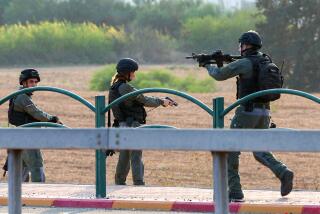Coalition’s Odd Man In
- Share via
MADRID — On March 16, Prime Minister Jose Maria Aznar of Spain met with President Bush and British Prime Minister Tony Blair in the Azores, where Aznar announced his firm support for the proposed coalition invasion of Iraq. He was the third leading member of a partnership that defied the U.N. Security Council and insisted on a decisive strike against Saddam Hussein. Since then, the triumphant Bush and Blair have been preoccupied with cleaning up the consequences of their intervention. But what has happened to Spain? Although its support was purely moral and logistical, does it also have a triumph to display?
What happened in Spain was so strange as to be virtually unique. In the rest of Western Europe, the media and public opinion were divided, debate was intense and passionate, there were several huge demonstrations in some countries, and the political parties agreed to differ among themselves. In contrast, Spain’s media and public were solidly against the war, there was almost no debate (because those who were pro-invasion felt it more discreet to keep silent), demonstrations became the norm and the political opposition abandoned the chamber for the streets.
For the record:
12:00 a.m. July 6, 2003 For The Record
Los Angeles Times Sunday July 06, 2003 Home Edition Opinion Part M Page 3 Editorial Pages Desk 0 inches; 29 words Type of Material: Correction
Spain and war -- An article that ran May 4 stated that Spain had not fought an international war in 300 years. Spain fought the United States in 1898-1899.
From Feb. 15 onward, the street marches, favored by the mild climate, were repeated almost daily and deeply affected the popular mind. They bore fruit in national polls, which at the end of March indicated that about 90% of Spaniards, similar to the numbers in Britain at that time, did not approve of a war with Iraq. The scale of the protests dismayed Aznar and his government, but also had other consequences.
The media quickly fell into line with public opinion; not a single newspaper dared risk circulation loss by supporting the government’s position. The main opposition Socialist Party, supported by the communists and the two trade unions, took to the streets to identify with mass opinion. It seemed as though the whole nation was united against its government.
Spain didn’t have a single soldier on combat duty in Iraq, but the street campaign contended that Spain was technically at war (many Spaniards believed that their troops were actually fighting in the Persian Gulf) and therefore responsible for everything that occurred. Slogans denounced Aznar as a mass murderer; scores of the party’s offices around the country were attacked and torched; professors suspended classes so that students could go out into the streets.
The atmosphere of social confrontation extended to journalists, who wrote hard-hitting attacks on the government and gave prominence to photographs of Iraqi children maimed by U.S. bombs. Antiwar journalists who disagreed with this approach kept silent. Personalities who had never denounced the terrorist separatist movement in the Basque country identified Aznar as a “terrorist.” In Barcelona, which became “the capital of peace,” according to one newspaper, the local Socialist leader compared Aznar to Hermann Goering; a journalist invited his readers to attack American citizens; and young demonstrators broke into and looted the main department store. A group of intellectuals demanded that Aznar be tried by an international court for crimes he had committed in the war.
For Spain, a small country that took no part whatsoever in the conduct of the war, the three weeks that Operation Iraqi Freedom lasted were curiously traumatic. Elsewhere in Europe, the antiwar movement was fueled by strong rejection of the use of force in international problems, as well as by idealism and anti-Americanism and anti-Semitism.
In Spain, there was an additional -- and fundamental -- factor. The country has not fought an international war in 300 years. Spaniards, furthermore, haven’t shown much interest in foreign affairs. They have been isolationist. Yet, the determining factor in Spanish attitudes continues to be Gen. Francisco Franco’s 36 years of authoritarian dictatorship in the 20th century. Protests against the Iraq war have therefore tended to be more about internal politics. In one of the first big antiwar meetings in Madrid, a film director claimed that Aznar was worse than Franco and accused the government of being fascist. It set the tone for subsequent protests, which revived all the progressive groups that had lost their bearings since the end of the Franco dictatorship but now felt the adrenaline rush of opposing war against Iraq.
This is not to discount the role of anti-Americanism, which took similar forms in Spain as elsewhere, including the trashing of McDonald’s restaurants. One newspaper columnist took the opportunity to inveigh against “Yankee aggression, which robbed us of our Caribbean colonies” (the loss of Cuba and Puerto Rico in 1898).
The most intense moments, however, came the day after the death of a Spanish TV cameraman in the Hotel Palestine in Baghdad. “The United States is killing Spaniards,” screamed a full-page headline in Barcelona’s El Periodico. The TV channel for which the cameraman worked, in an unusual display of bias, announced during a newscast that he had been “murdered by U.S. troops.” Another Spanish journalist had died shortly before the cameraman, when an Iraqi missile hit a U.S. armored vehicle in which he was traveling. A Madrid newspaper executive asserted that there were reasons to believe that it was really an American missile.
The confrontation among Spaniards has left many wounds. The Socialist opposition leader, Jose Luis Rodriguez Zapatero, commented during his street campaigns: “All of Europe and Latin America know that the voice of Aznar is not that of Spain.” Only election results can prove or disprove him. An early test will be the ruling Popular Party’s showing in municipal and regional elections scheduled for May 25.
Already, there are signs that street demonstrations are an unreliable guide to voting behavior. In the latest postwar Spanish polls, the proportion of those who say they remain opposed to the war in Iraq has fallen by one-third; the governing party leads by 2.5% over the opposition among voters who intend to go to the polls; and public approval of Aznar as a leader surpasses that of Zapatero. The volatility of Spanish public opinion calls into question the recent claim of the New York Times that “there may still be two superpowers on the planet: the United States and world public opinion.” Truth is, public opinion comes and goes like a mirage; American power, by contrast, is palpable and solid.
Meanwhile, an unrepentant Aznar, who will not be a candidate in the next general elections a year away, continues to emphasize that Spain has done a good job helping to topple Hussein. (Last week, during a visit by Secretary of State Colin L. Powell, Spain announced it was ready to deploy 500 military police officers to help keep order in Iraq.) The only thing that might hold the country back, Aznar said in a speech April 24, is its “tendency to isolation.” Government policy, he said, aimed “to give coherence to the international position of democratic Spain, in accord with the changes that have taken place in Europe and in the world.” In an incisive phrase, he affirmed: “We should not be afraid of being in the world.”
More to Read
Sign up for Essential California
The most important California stories and recommendations in your inbox every morning.
You may occasionally receive promotional content from the Los Angeles Times.













